
Estimated reading time: 4 minutes and 45 seconds
Kidney Failure Treatment
Comprehensive Kidney Failure Treatment at Aktif International Hospitals
Kidney failure, also known as end-stage renal disease (ESRD), is a serious medical condition in which the kidneys lose their ability to function properly, leading to a buildup of waste products and fluids in the body. Without prompt treatment, kidney failure can lead to life-threatening complications. At Aktif International Hospitals, we offer comprehensive treatment for kidney failure, including dialysis, kidney transplant, and specialized care provided by experienced nephrologists and healthcare professionals.
Frequently Asked Questions
What is kidney failure, and why is it important?
Kidney failure, or end-stage renal disease (ESRD), occurs when the kidneys are no longer able to effectively filter waste products and excess fluids from the blood. This can lead to a buildup of toxins and fluid in the body, resulting in symptoms such as fatigue, swelling, shortness of breath, nausea, and changes in urination. Kidney failure is a serious and potentially life-threatening condition that requires prompt medical attention and treatment to prevent complications and improve quality of life.
What are the causes and risk factors for kidney failure?
Kidney failure can be caused by a variety of factors, including:
- Chronic kidney disease (CKD): Long-term damage to the kidneys from conditions such as diabetes, high blood pressure, or glomerulonephritis can lead to kidney failure over time.
- Acute kidney injury (AKI): Sudden and severe kidney damage from conditions such as infection, dehydration, or kidney stones can cause acute kidney injury, which may progress to chronic kidney disease and ultimately kidney failure if not treated promptly.
- Genetic disorders: Inherited conditions such as polycystic kidney disease (PKD) or Alport syndrome can cause progressive kidney damage and lead to kidney failure.
- Autoimmune diseases: Conditions such as lupus or vasculitis can cause inflammation in the kidneys and impair their function, leading to kidney failure.
- Medications and toxins: Certain medications, toxins, and environmental factors can damage the kidneys and contribute to kidney failure.
What are the signs and symptoms of kidney failure?
The signs and symptoms of kidney failure may include:
- Fatigue: Feeling tired or lethargic, even after resting.
- Swelling: Swelling of the legs, ankles, feet, face, or hands due to fluid retention.
- Shortness of breath: Difficulty breathing or shortness of breath, especially during physical activity or when lying flat.
- Nausea and vomiting: Feeling nauseous or vomiting, often accompanied by loss of appetite.
- Changes in urination: Changes in urination patterns, such as decreased urine output, foamy urine, or blood in the urine.
- Itching: Persistent itching or dry skin, often due to the buildup of waste products in the blood.
It’s important to seek medical attention promptly if you experience any signs or symptoms of kidney failure, as early diagnosis and treatment can help slow the progression of the disease and improve outcomes.
How is kidney failure diagnosed?
Kidney failure is diagnosed based on a combination of clinical evaluation, medical history, physical examination, and laboratory testing, including:
- Blood tests: Blood tests such as serum creatinine, blood urea nitrogen (BUN), and estimated glomerular filtration rate (eGFR) are used to assess kidney function and determine the severity of kidney damage.
- Urinalysis: Urinalysis can help detect abnormalities in the urine, such as proteinuria, hematuria, or changes in urine concentration.
- Imaging tests: Imaging tests such as ultrasound, CT scan, or MRI may be performed to evaluate the structure and function of the kidneys and urinary tract.
How is kidney failure treatment performed at Aktif International Hospitals?
At Aktif International Hospitals, we offer comprehensive treatment options for kidney failure, including:
- Dialysis: Dialysis is a medical treatment that helps remove waste products and excess fluids from the blood when the kidneys are no longer able to do so effectively. Dialysis can be performed in two main ways: hemodialysis, which involves filtering the blood through a machine, or peritoneal dialysis, which involves using the lining of the abdomen (peritoneum) as a filter.
- Kidney transplant: Kidney transplant is a surgical procedure in which a healthy kidney from a donor is implanted into the body of a patient with kidney failure. Kidney transplant offers the best long-term outcomes and quality of life for many patients with kidney failure.
- Medication management: Medications may be prescribed to help manage symptoms, control blood pressure, treat complications, and slow the progression of kidney disease.
Our team of experienced nephrologists, transplant surgeons, and healthcare professionals work together to develop individualized treatment plans tailored to each patient’s specific needs and circumstances.
Why choose Aktif International Hospitals for kidney failure treatment?
Aktif International Hospitals is dedicated to providing compassionate, expert care for patients with kidney failure and their families. Our multidisciplinary team of healthcare professionals has extensive experience in diagnosing and treating kidney failure and is committed to delivering safe, effective, and personalized care to achieve the best possible outcomes for our patients.
Trust Aktif International Hospitals for Expert Kidney Failure Treatment
If you or a loved one is living with kidney failure, don’t wait to seek medical attention. Trust Aktif International Hospitals to provide prompt diagnosis, effective treatment, and compassionate support for you and your family. Schedule a consultation with our experienced healthcare team today to learn more about our services and how we can help you overcome kidney failure with confidence and peace of mind.
Author: Göksel Verim


 TR
TR